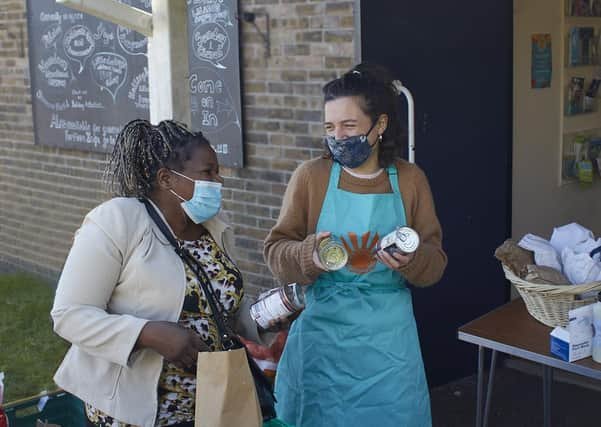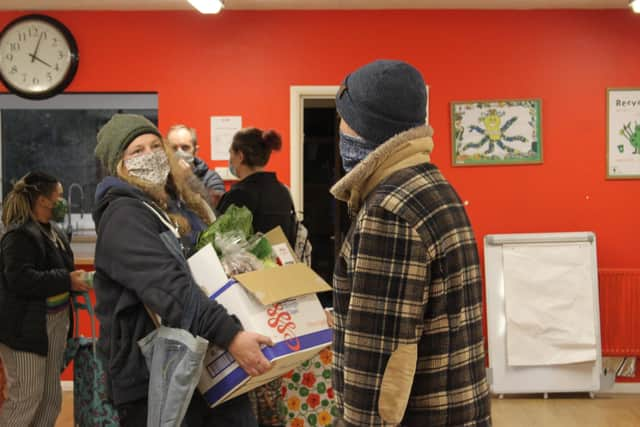Social grocery store offers a community alternative to foodbanks in Brighton and Hove


The idea for Brightstore was hatched by a small group of volunteers who had all been doing work with food banks during the pandemic.
Joel Essex, one of the volunteers, said: “We just thought, there’s got to be a better way of doing this, a more long-term alternative.”
Advertisement
Hide AdAdvertisement
Hide AdThey came up with the idea of a hosting a pop-up grocery shop in the community once a week, where people would be able to pay on a pay-what-you-can-afford basis.


Unlike with a food parcel, people are able to choose what they take home with them.
Joel said foodbanks played an important role but were not necessarily the most positive experience for the people who used them.
“There’s something about foodbanks which are a bit of an emergency, short term sticking plaster, a fix to a problem that is a bit more deep-seated,” he said.
Advertisement
Hide AdAdvertisement
Hide Ad“We feel that this is a much more positive and sustainable solution to the issue of food insecurity.”
Brightstore, which is supported by Brighton and Hove Food Partnership, started off in Hollingdean every Tuesday at the Hollingdean Community Centre and in January launched at the Vallance Community Centre in Hove every Thursday.
There are two levels of membership – depending on what people can afford to pay – and some free memberships for those in particular need.
“The idea is that if people can afford a bit more, it supports members that would otherwise go to foodbanks to have a free membership,” Joel said.
Advertisement
Hide AdAdvertisement
Hide Ad“They can still get free food, but in a much different way.”
He said the ‘solidarity principle’ was working well. “We find that people are very honest,” he said. “There’s a nice level of trust.”
Key to the concept of the store is making it ‘a really positive experience’ for all those who visit and creating a sense of community.
Joel said a recent member survey had shown that people really enjoyed the opportunity to connect with others.
Advertisement
Hide AdAdvertisement
Hide Ad“People have been locked in their homes for quite a lot of the last year, so I think people really value actually being able to socialise,” he said.
The stores stock fresh food and vegetables, the bulk of which comes from Fareshare and the Brighton Food Factory, while local businesses – such as The Flour Pot Bakery – donate other items.
Everything stocked is surplus food which would otherwise have gone to waste.
“This is very much about creating a more sustainable approach to local food systems, and saying that there are alternatives out there in your local community and in your local area,” Joel said.
Advertisement
Hide AdAdvertisement
Hide Ad“You don’t necessarily have to get on a bus and go to the supermarket where it’s more expensive, and the experience is not as friendly or as social as going to a community or social supermarket.”
Brightstore currently has 165 active members and, since opening in October, has provided 1,248 weekly household shops for members in Hollingdean and Hove – feeding 3,017 people.
And it looks set to branch out to other locations in the city.
Amanda Brace and other volunteers have been running their own community supermarket in Pankhurst Avenue, but are in talks with Brightstore about linking up and coming under their organisational umbrella.
Advertisement
Hide AdAdvertisement
Hide AdBased at the Edge Community Centre once a week on Fridays, it is currently used by between 25 to 30 households.
Amanda said it was ‘much better’ than a foodbank model. “People just love it,” she said. “People are able to choose what they have.
“It’s more empowering. We’re trying to give people back a bit of dignity and a bit of agency.
“It’s getting people to be part of something.”
She said the hyper-local model meant people could walk there and back with their shopping, without having to travel further afield.
Advertisement
Hide AdAdvertisement
Hide Ad“It’s a shame we have so much food poverty in the city, but this is a good solution to it,” she said.
“If we were to go out of business completely, it would be great, because it would mean we’re not needed anymore. But we’re not there yet.”
Anyone interested in finding out more or supporting BrightStore, visit www.brightstore.org